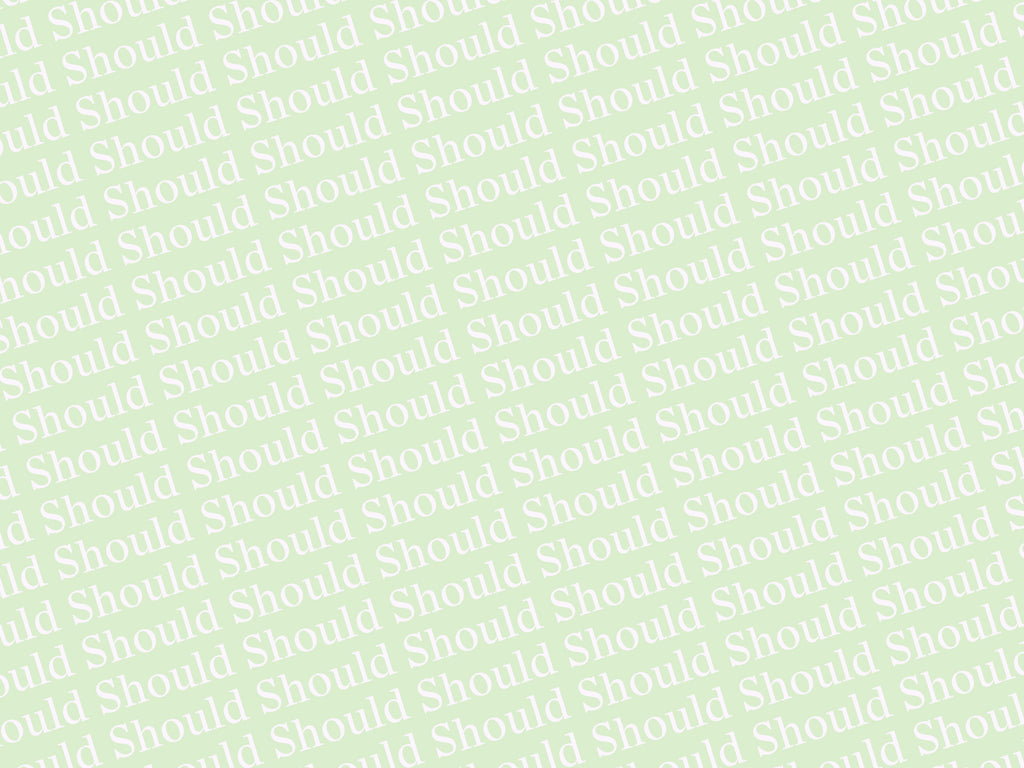It happened a few months ago. I bicycled to my local gym and said hello to a regular who lives in my neighborhood. “I really should bike here,” she told me. But why? I thought. She had already accomplished the hard part, arriving to our challenging weight training class. Why add on one more “should?”
I’m guilty of this myself: I should cook at home more, I should make the bed, I should work out more, I should be adult enough to keep a succulent alive, I should finally getting around to learning how to smize in my Instagram photos, I should call my mom. But hearing the word aloud from my gym classmate made me pause my endless cycle of shoulds—only compounded by my new year’s resolutions.
Our waterfall of shoulds is clouding our to-do lists and they often imply we’ve already failed and—frankly—they often don’t seem to make us more productive. UK-based psychologist Sophie Mort a.k.a. Dr. Soph agrees with this. In a recent blog, she examines how “should” is a form of self-criticism, writing: “When we criticize and reject ourselves (even in such a subtle manner as when using the word should) we create anxiety and stress in our minds and bodies. What do we know about anxiety and stress? … They shut down our brains ability to problem solve and to maintain attention to a new task.”
“Our waterfall of shoulds … often imply we’ve already failed and—frankly—they often don’t seem to make us more productive.”
Sound familiar? To get some insight about how to escape the anxiety surrounding the “should” cycle I called up my former colleague Cindy Finch, who is a writer, clinical therapist, and adjunct professor of psychology at Pepperdine University.
“In my circle, we call that should-ing on yourself,” Finch said. “When I say “should” it’s a shame-based statement. And by that, I mean that it’s not that I made a mistake, or did something wrong. It’s I am wrong at a core level.” She says that when we use shame as a belief, at its roots is the idea that we are flawed. “If I say words like ‘should, aught, must’ I’m not teaching myself new behavior. I’m just using a negative emotion to create a positive behavior—and that doesn’t work.”
Instead it can be helpful to understand how change happens and lean into that. Just how does change occur? She says it starts with a thought or an urge. “For example, if I want to run a marathon I don’t just begin at the start line on a Sunday morning at the LA Marathon—there were multiple steps before that like picking out shoes, finding a running partner, practicing … it’s a very long build up to run a marathon. But even before all of that happens the thought of, ‘Maybe I want to run a marathon,’ is the beginning of change,” Finch explains.
“If I say words like ‘should, aught, must’ I’m not teaching myself new behavior. I’m just using a negative emotion to create a positive behavior—and that doesn’t work.”
But if the next day you wake up and don’t go for a run or your too hungover from happy hour, and start blaming yourself for not being able to even get out the door—pause. “Don’t beat yourself up and say, ‘you idiot you didn’t go running,” Finch says. “We short circuit ourselves when we get into the blaming and shaming.”
A better way than “should-ing” on yourself? Stop and notice those negative thoughts and shift them to staying curious about what a runner might do instead of blaming yourself, Finch says. “That’s has a whole different feeling to it than I’m just a piece of shit that didn’t get out of bed today.” You might not have gotten out of bed for a run, but you can spend time finding a group of other runners to help you stay accountable, plan your training schedule, or research new running gear that you need online.
While you’re at it, it helps to give yourself some sort of validation in the form of a positive or supportive comment and to stay away from all-or-nothing thinking. Finch says to take out the judgement good or bad, and manage your expectations by setting small achievable goals—and celebrating your wins even if they’re small.
“A lot of us have the narrative in our head that if you really wanted to do something you already would have done it. Instead notice the small things that are unfolding where change is happening,” Finch says. She calls it gentle awareness.
Finch recognizes that some people are indeed motivated by shame—but it’s likely that they burn out quicker. “That’s a stressful way to live,” she says. Why not instead, take a non-judgement stance towards yourself and others to protect your energy.
According to Finch, another way to get out of the should trap is to build in solutions. If you build in a partner that is going to meet you at the gym, for example, then there is no “should.” Try problem solving ahead of time so you don’t get into the loop of mental anguish.
What are some words to use instead of “should”? I can go the gym. Iget to make my bed. I choose to spend an extra hour studying or reading.
If you give yourself a choice—you haven’t already failed.



